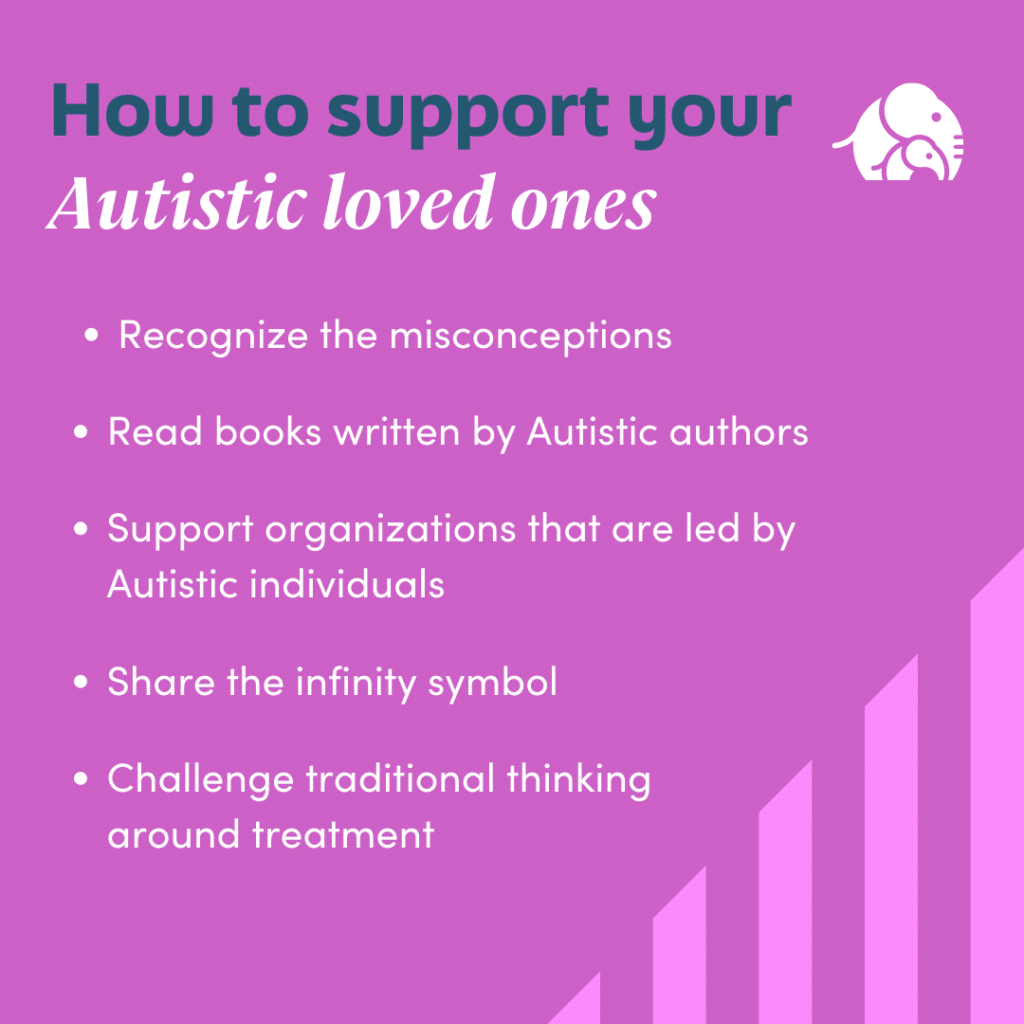Autism Spectrum Disorder (ASD) is defined as, “a neurological and developmental disorder that affects how people interact with others, communicate, learn and behave”. It is important to understand that autism affects how someone interacts with others, exists on a spectrum, and it looks different for everyone. There are a lot of misconceptions and over-generalizations out there about ASD, so let’s dive into some important ways we can learn more and support those on the autism spectrum.
Need more support for you or a loved one? Find an Ellie location near you and get matched with the right therapist for you today.
Tips for Supporting Autistic Loved Ones
To support awareness of the importance of autism acceptance, we have enlisted the help of some of Ellie’s therapists to share tips, tools, and resources. There are many ways to support our autistic loved ones, and we are going to highlight seven important ways you can support autism acceptance.

Use Identity-First Language When Referring to Autistic Folks
You might be used to hearing about “person-first language,” which is typically the best practice when referring to others. (For example, this means saying “person with epilepsy” instead of “epileptic person.”) However, some of our autism experts and therapists discussed that “identity-first” language is typically what autistic folks prefer. According to Raising Children, “Many autistic people and autism experts and advocates prefer identity-first language because it indicates that being autistic is an inherent part of a person’s identity, not an addition to it.”
One of our mental health practitioners at Ellie, Zane, suggests asking your loved one what they prefer, as they might identify as a person with autism, (person first) or as an autistic person (identity first). After you ask, be sure to use the language that best supports your loved one as an autistic person or a person with autism– whatever they prefer. He adds: “At the end of the day, reading, listening to, and hearing from actually autistic individuals about their experiences is crucial.”
Recognize the Misconceptions
There are SO many misconceptions about ASD. Some of these misconceptions are focused around the level of intelligence and some are focused around the behaviors of autistic people: but they are all misconceptions or over-generalizations. The truth is one cannot predict how an autistic person will behave. Some of the misconceptions experienced by autistic people are listed below:
- They are unintelligent: Many autistic people do NOT have intellectual impairment. This concept stems for the belief all autistic people are only nonverbal or savants. Most autistic people fall somewhere in between—remember this is a spectrum!
- They are rigid in their thinking: Like the rest of the population, many autistic people are open minded! For example, one of our autistic therapists, Anna Trout, reports that a high number of autistic folks are part of the LGBTQIA community, and she adds “I think the rigidity comes around passions or if people say something that we know is factually incorrect,” not general rigidity or close-mindedness.
- That autism looks a certain way: Again, this is a spectrum, and there are many different presentations of autism. Plus, typical diagnostic criteria often doesn’t capture the experiences of people of color, women, disabled, and the LGBTQ+ community.
- That you must have a diagnosis in order to identify as autistic or on the autism spectrum. Autism assessments for adults are often not covered by insurance or they are difficult to obtain, which is why many adults self-diagnose. Although it is best practice to get a diagnosis from a trained professional because they can offer extra support and recommendations, there are still many websites and resources that can offer information if you think you might have autism (and it can be helpful and valid!).
Read Books Written by Autistic Authors
Reading books and finding resources written and provided by autistic authors and individuals provides support for autism and allows for actual connection to autistic world—it also helps to fight some of the misconceptions mentioned earlier. Here are some books that were written by autistic authors:
- Unmasking Autism written by Devon Price
- Look Me In The Eye: My Life with Asperger’s by John Elder Robison
- Your Child Is Not Broken by Heidi Mavir
- But You Don’t Look Autistic At All by Bianca Toeps
- The Reason I Jump: The Inner Voice of A Thirteen-year-old Boy With Autism by Naoki Higashida
- The Secret Life of a Black Aspie: A Memoir by Anand Prahlad
Other helpful resources connected to autism shared by our therapists include:
- Autism Source, Autism Society of America (ASA)
- ASA is a database source for local communities providing resources of ways to obtain help.
- Life Journey Through Autism Series, Organization for Autism Research (OAR)
- Provides resources to learn more about autism and help parents with obtaining information
- A parents guide to assessment
- A parents guide to research
- A guide for transition to adulthood
- Testing options: Caring for Children with Autism Spectrum Disorders: A Resource Toolkit for Clinicians.
- A clinical resource to help with recognition, evaluation and ongoing management of ASD throughout the patient’s life span. This is through the American Academy of Pediatrics (AAP).
Support Organizations that are Led by Autistic Individuals
Support organizations run by autistic persons as it helps to grow awareness, acceptance and understanding of autism. Especially in spaces where acceptance of adult autism is needed. Some great organizations to support are:
- ASAN Autistic Self Advocacy Network is a nonprofit organization run by autistic people, created to support and service individuals on the spectrum and work to educate communities and improve public perceptions of autism
- AWN Autistic Women and Non-binary Network a nonprofit organization committed to disability justice, gender and racial equity, neurodiversity and trans liberation with a focus on changing and restoring justice in disability spaces.
Share the Infinity Symbol
You may have seen the puzzle pieces used as a symbol for autism, but recently the puzzle piece was replaced with a rainbow-colored infinity symbol to represent a spectrum, diversity, and difference. It removes the notion that those with autism are missing something or are incomplete and that “having a lack does not make me less human than the rest of the world,”
Wear Rainbow, Gold, and Red
April 2nd is World Autism Awareness Day, which makes it the perfect time to wear rainbows, red or gold support our autistic loved ones. These colors promote acceptance of all differences within the autism community:
- The color gold symbolizes the feeling of acceptance.
- The rainbow colors represent the diversity of children within the autism spectrum. The rainbow represents different autism symptoms, obstacles and abilities autistic children face
- The color red represents awareness of autism. Red is a vibrant color and creates energy which helps to raise acceptance and understanding of autism.
Challenge Traditional Thinking Around Treatment
It’s important to remember that autism does not need treatment or a cure, but rather, many of the distressing symptoms can be treated through therapy or medication management.
There are a variety of therapies necessary to support autism and meet the needs of autistic folks. While ABA is often viewed as the best practice for the treatment of autism, this doesn’t work for everyone and many autistic people do not support its use and argue that it can be harmful or too hard on kids. These are some other therapy options that are often recommended.
- Cognitive Behavioral Therapy
- MusicTherapy
- Play Therapy
- Relationship Development Intervention
- Social Skills Groups
Supporting autism does not just mean we just do these things listed above, but it means that we try to learn more, accept those who are autistic, and create spaces where all can feel appreciated and celebrated differences and all. Many people live on the autism spectrum, and even more are supporting a family member with autism.
It is important to not only understand autism, be aware of how it impacts our lives and meet those difference with acceptance. Through the support of individuals within the Ellie community we were able to provide readers with ways to be support our autistic loved ones. Autism is NOT about finding the missing puzzle piece of a person, but it IS about accepting the pieces that makes each person unique and exceptional.
Need more support for you or a loved one? Find an Ellie location near you and get matched with the right therapist for you today.


